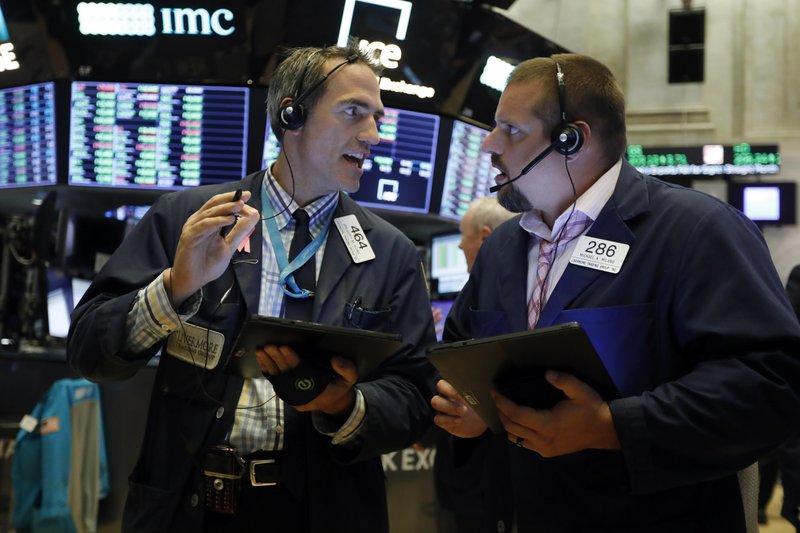The Dow Jones industrial average plunged more than 600 points Friday after the latest escalation in the trade war between the U.S. and China rattled investors. The broad sell-off sent the S&P 500 to its fourth-straight weekly loss.
Stocks tumbled after President Donald Trump demanded that U.S. companies with operations in China consider moving them to other countries -- including the U.S. -- just hours after Beijing announced new tariffs on $75 billion in U.S. goods.
Trump also announced after the market closed that the U.S. would increase existing tariffs on $250 billion in Chinese goods, and that tariffs on additional goods expected to kick in on Sept. 1 would be at 15% instead of 10%. Those announcements are likely to influence stock markets in Asia when trading opens there Monday.
In New York, the S&P 500 fell 75.84 points, or 2.6%, to 2,847.11. The index is now down 4.5% for the month. It's still up 13.6% for the year.
The Dow lost 623.34 points, or 2.4%, to 25,628.90. The average briefly dropped 745 points. The Dow has had five declines of 2% or more this year, with three of them coming this month.
The Nasdaq gave up 239.62 points, or 3%, to 7,751.77. The Russell 2000 index of smaller company stocks skidded 46.52 points, or 3.1%, to 1,459.49.
Friday's developments mark the latest escalation of an ongoing trade dispute between Washington and Beijing that has threatened the global economy and weighed on markets.
"The market is spooked by the escalation in the trade war," said Janet Johnston, portfolio manager at TrimTabs Asset Management. "Investors are looking for an endgame and we haven't seen it yet."
Trump also said Friday morning that he was "ordering" UPS, FedEx and Amazon to block any deliveries from China of the powerful opioid drug fentanyl. The stocks of all three companies fell as traders tried to assess the possible implications.
Matt Arnold, an analyst who covers FedEx and UPS for Edward Jones, said it could be difficult for the companies to comply should the administration draft detailed guidelines for rooting out fentanyl.
The market opened lower Friday with the news of the new China tariffs. It recovered a bit after a widely anticipated speech by Jerome Powell where the chairman of the Federal Reserve indicated the central bank was prepared to cut interest rates but gave no clear signal on when and by how much.
Speaking at a Fed policy conference in Jackson Hole, Wyo., Powell noted that there's growing evidence of a global economic slowdown and suggested that uncertainty over Trump's trade wars has complicated the central bank's ability to set interest-rate policy. Powell said the Fed "will act as appropriate to sustain the expansion."
Some economists saw Powell's speech as setting the stage for further interest-rate cuts this year. A quarter-point rate cut in September is considered likely. Some think the Fed will cut rates again in December.
Stock trading Friday was a prime example of the crosscurrents confounding investors. Throughout the year, stocks have tumbled on concerns about the continuing trade fight, only to be lifted by hopes that interest-rate cuts from the Fed could contain the damage caused by the conflict. More tariffs threats from Beijing or Washington then start the cycle again.
Technology companies, which have much to lose in the trade battle, bore the brunt of the sell-off. Apple slid 4.6% and Microsoft gave up 3.2%. Chipmaker Nvidia dropped 5.3%.
Companies that rely on consumer spending also took losses. Retailer L Brands plunged 9.3%.
Energy stocks headed lower along with crude-oil prices. The price of benchmark crude sank $1.18, or 2.1%, to settle at $54.17 a barrel as traders worried that the latest escalation in the trade battle could sap global demand for energy.
Concerns about economic growth have touched off a global rush of money into the safety of bond markets. That has pushed bond prices up, while driving yields sharply lower. Such drops suggest that investors are lowering their expectations for economic growth and inflation.
The trend continued Friday, with U.S. bond prices rising sharply, sending yields lower. The yield on the 10-year Treasury fell to 1.53% from 1.61%, considered a large move.
The bond market's U.S. recession indicator -- the spread between two- and 10-year rates -- flirted with inversion again. Elsewhere in the yield curve, three-month and 10-year Treasurys hit the most inverted level since March 2007. The dollar dropped as Trump said that "we have a very strong dollar and a very weak Fed," fueling chatter about a possible move to weaken the currency.
Banks fell because lower yields can translate to a decline in the interest rate that lenders charge for mortgages and other consumer loans. JPMorgan Chase lost 2.5% and Citigroup dropped 3.1%.
The price of gold, another safe haven for investors during times of market turbulence and economic weakness, rose $29.30 to $1,526.60 per ounce.
In other commodities trading Friday, Brent crude oil, the international standard, fell 58 cents to close at $59.34 a barrel. Wholesale gasoline fell 3 cents to $1.64 per gallon. Heating oil declined 2 cents to $1.82 per gallon. Natural gas fell 1 cent to $1.15 per 1,000 cubic feet.
Silver fell 39 cents to $17.40 per ounce and copper fell 2 cents to $2.53 per pound.
The dollar fell to 105.31 Japanese yen from 106.41 yen on Thursday. The euro strengthened to $1.1145 from $1.1085.
Information for this article was contributed by Alex Veiga and David Koenig of The Associated Press; by Matt Phillips of The New York Times; and by Rita Nazareth and Vildana Hajric of Bloomberg News.
A Section on 08/24/2019

